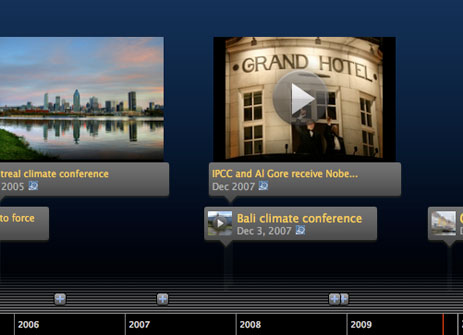So who will be the real power players in Copenhagen? The official estimate for official delegates attending the U.N. climate conference hovers somewhere around a gajillion. OK, seriously, it’s a mere 20,000. Then there are thousands of activists, journalists, business leaders, and NGO reps who will be seeking the delegates’ ears. Here are 15 people worth watching—ones who wield outsize potential to shape the outcome, or to shape the narrative that affects the outcome. And two you can safely ignore.
There’s a text version below the slideshow for you multimedia haters and search-engine spiders, ahem.
Fifteen to watch:
Lars Loekke Rasmussen, Denmark’s Prime Minister—The chairman of the climate talks naturally wants some positive news to come out of the host city. He’s promoting a two-step deal: reach a political agreement in Copenhagen, then hash out the “legally binding” part in 2010. But signing a toothless deal in Copenhagen could take the pressure off richer countries to do the hard part next year, as one analyst notes. It would help heads of state like Rasmussen (and Barack Obama) save face, but a “one agreement, two steps” approach might prove impossible to finish.
Abdalla Salem El-Badri, Secretary General of OPEC (Organization of the Petroleum Exporting Countries)—The oil group’s lead Copenhagen negotiator made news this fall by saying OPEC nations should be compensated as oil-burning countries reduce their consumption. Buy less, pay more? It sounds absurd at face value, but world leaders may see the peril in destabilizing economies in the Middle East and other oil-exporting states.
Jairam Ramesh, India’s Environment Minister—India’s lead negotiator has been plain unpredictable this year, first staking a rather belligerent “development first, cleanup later” position, then making overtures toward a side deal with the U.S. Recently he denied that climate change is melting Himalayan glaciers, the main source of the subcontinent’s water. That odd claim earned a very public rebuke from fellow countryman Rajendra Pachauri, the chairman of the United Nations Intergovernmental Panel on Climate Change.
Bill McKibben, 350.org founder and Grist advisor—Few have been reporting and tracking global warming longer than McKibben, who wrote the first book on the topic for a general audience (1989’s End of Nature). Lately he’s criticized Obama’s leadership on climate (though David Roberts criticizes his criticism). McKibben will be in Copenhagen as a reporter for Grist and Mother Jones, an organizer for 350.org, and a voice of conscience for the army of activists he’s helped mobilize.
The Yes Men, Pranksters Extraordinaire—There will be plenty of earnest activism and heartfelt pleas to Think of the Children and Puppies. For something fresher, look to America’s most inventive activists, Andy Bichlbaum and Mike Bonanno. They’ve made fools of Dow Chemical, Halliburton, and the U.S. Chamber of Commerce. Now they’ve launched BeyondTalk.net to organize civil disobedience aimed at Copenhagen, with more yet to be revealed.
Luiz Inacio Lula da Silva, President of Brazil—Brazil’s leader has staked part of his legacy to protecting Amazon rainforests, and world leaders have good reason to encourage him–razing forests worldwide has caused about 40% of carbon dioxide emissions. Lula will be keen to reach a deal that involves other countries paying Brazil and Indonesia to preserve their forests—and it’s one of the more likely agreements to be reached in Copenhagen.
Kevin Conrad, lead delegate of Papua New Guinea—The negotiator for this tiny* Pacific island nation drew wild applause and brief fame at the 2007 Bali climate talks, when he told the United States, “If for some reason you’re not willing to lead, leave it to the rest of us. Please get out of the way.” Within minutes the American delegate withdrew an objection, allowing a deal to be struck. Since that folk-hero moment, Conrad has been a leading voice for the Alliance of Small Island States (AOSIS), many of which have their existed threatened by rising sea levels. He’s another key supporter of a forest-protection plan.
Ed Miliband, Britain’s Secretary of State for Energy and Climate Change—Miliband blurs the line between politician and activist, running the “Ed’s pledge” campaign for a binding deal in Copenhagen (don’t hold your breath, Ed). He’s also refused to puff up a non-binding temporary agreement—the kind that would help world leaders save face–saying he wouldn’t back that sort of “inadequate” deal.
Brian Flannery, Exxon Mobil’s Science, Strategy and Programs Manager—The energy giant’s veteran climate advisor might keep a low-profile in Copenhagen—dirty-energy reps tend to use international gatherings for networking, then exert their influence back in national capitals. Like the company that employs him, Flannery no longer denies climate change outright. Instead, the new industry push is for slower plans, lower targets, and alternatives like “let’s just adapt to it instead.”
Jonathan Pershing, chief American negotiator and Deputy Special Envoy for Climate Change—In 1997 Al Gore jetted to the log-jammed Kyoto climate talks to help “save” the negotiations at the last minute. But the Senate never ratified the deal he struck, and the U.S. never joined the Kyoto plan. By contrast, Barack Obama’s negotiation team has been careful not to promise anything it can’t deliver (meaning anything the Senate won’t approve). That’s made it a villain on the world stage. Pershing, the lead negotiator and a veteran diplomat from the Clinton administration, has been generally candid about the Obama administration’s difficult position.
Michael Martin, Canada’s chief negotiator and Ambassador for Climate Change—Martin must defend what one scientist-activist called Canada’s “obstructionist position” on climate policy. It’s driven in part by the polluter-friendly leanings of Prime Minister Stephen Harper and the incredibly dirty but lucrative Alberta tar sands.
Ibrahim Mirghani Ibrahim, Sudan’s lead delegate—Sudan holds the chairmanship of the G77, a bloc of developing countries that negotiates together. The nation’s top negotiator wants to ensure the next deal follows in the tracks of the Kyoto Protocol, which does not require developing countries to cut their emissions. Industrialized nations want to begin a new track, or combine the two. Ibrahim’s contentious position ensures that resolving this will be a sticky (if technical) challenge in Copenhagen.
Angelica Navarro, Bolivia’s top climate negotiator—At preliminary meetings in both Bonn and Barcelona this year, Navarro gave bold speeches on behalf of poor countries, low-lying countries, and vulnerable parts of India, China, and Brazil. Millions of people “are suffering from the effects of a problem to which they did not contribute,” she told the wealthier delegates in Barcelona. There will be plenty of moral appeals from small countries such as Bolivia and the Maldives; Navarro’s could be one that stands out.
The Grist reporting team, of course!—We’ll have an A-Team on the ground: comedian and Flight of the Conchords actor Eugene Mirman, green-living guru Umbra Fisk, and crackerjack reporters Amanda Little and Jonathan Hiskes. [Reporter’s note: My editor wrote that “crackerjack” part. I may indulge in self-promotion, but I never describe myself with HFCS-laden adjectives.] [Editor’s note: Oh, get over yourself.] Stay tuned to Grist’s Copenhagen hub for the best coverage around.
Barack Obama, United States President—It’s easy to overstate the president’s power, given how much the U.S. Senate has tied his hands. He hasn’t even said if he’s attending (even though he’ll be in the neighborhood to pick up that Nobel Peace Prize on December 10). Yet Obama could bring attention and prestige to the beleaguered proceedings, more so than any other world leader. If he goes, he’ll be the one to watch.
And two you can safely ignore:
Bjørn Lomborg, founder of the Copenhagen Consensus Center—The Danish political scientist, self-styled “Skeptical Environmentalist,” and savvy publicity seeker will make the most of home-town advantage to push his silly argument that the world must choose between helping the poor and addressing climate change. His signature rhetorical move is to frame multiple worthwhile goals as an either/or choice. Choose emissions cuts or fighting malaria, because you can’t do both. Don’t fall for it.
James Inhofe, Republican Senator of Oklahoma—The notorious climate skeptic famously called global warming “the greatest hoax ever perpetrated on the American people.” He promises to bring a “truth squad” to Denmark in hopes of undermining the Obama administration’s efforts and making sure the world knows just how contemptuous of 21st century science a U.S. senator can be. Admittedly, he may be tough to ignore—adolescent antics can be entertaining.
* Papua New Guinea, with some 6.7 million people and 178,704 sqare miles, isn’t tiny. Thanks for the catch, readers.




